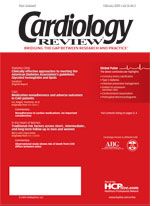Can fish intake reduce stroke risk?
A 71-year-old woman arrived at her physician’s office for a follow-up visit. She had a history of hypertension, which was well-controlled with a diuretic and an angiotensin-converting enzyme inhibitor. She had smoked cigarettes for more than 30 years in the past, but quit on her 65th birthday and had not smoked since. She did not have diabetes and was not obese. She was independent and active, walking 20 to 30 minutes daily most days of the week. Her total serum cholesterol level was modestly elevated, but her total cholesterol to high-density lipoprotein cholesterol ratio was within the optimal range. One year earlier, she had a transient ischemic attack, with evaluation at that time revealing 30% to 40% carotid atherosclerosis bilaterally and modest left ventricular hypertrophy with preserved systolic function. Since that time, she had been taking one aspirin, 325 mg, daily. On physical examination, she was an alert elderly woman, with a heart rate of 70 beats per minute, a blood pressure of 128/65 mm Hg, and unremarkable cardiac, pulmonary, and neurologic examinations.
At this visit, she related that her first cousin recently had a “massive” stroke. This cousin had previously been living independently, playing golf, and traveling, but now had complete left-sided hemiparesis and lived in a nursing home. She was concerned about her own risk of stroke and wished to know what she could do to reduce her risk further. She had heard that fish might be good for the heart and wondered if fish intake might have any effect on stroke risk, particularly at her age. Also, if there was a potential benefit from fish intake, she wished to know how frequently she should consume fish to obtain that benefit and whether the type of fish meal consumed or the method of preparation make a difference.
Based on the current evidence, she was advised to consume at least one serving per week of fatty or oily fish, such as salmon, herring, or tuna, and informed that intake of lean (white) fish might not provide similar benefits, particularly if fried.
